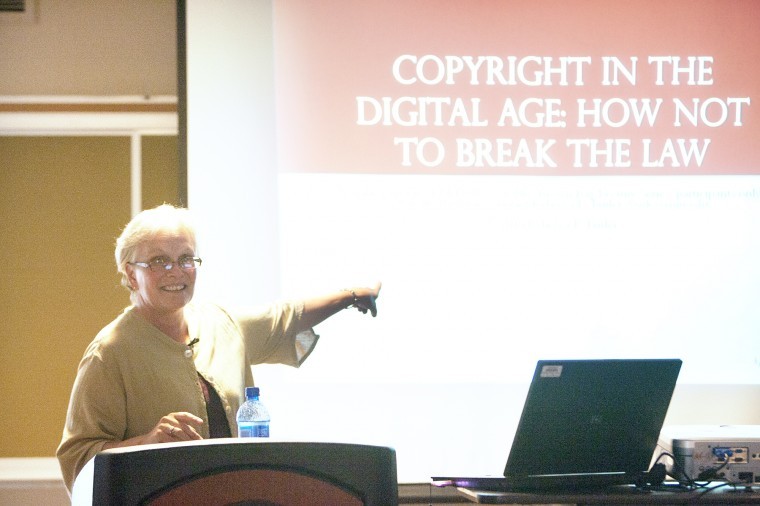Digital copyright laws ‘so weird,’ difficult to navigate
Presidential teaching professor Rebecca Butler speaks during a presentation of “Copyright in the digital age: How not to break the law” in Holmes Student Center Room 505 Tuesday afternoon. The presentation, which focused on a variety of copyright laws, was part of the NIU Notables Brown Bag Lecture Series.
September 22, 2010
Thanks to technology, we live in a time where literally anything and everything you can think of is right at your fingertips.
However, that doesn’t mean it’s alright to simply snag any of these things.
At least not with the complications of copyright laws. This is why presidential teaching professor Rebecca Butler decided to hold a talk about how to not break copyright law.
Butler has spent 15 years studying copyright law, and when trying to sum it up, all she could say was “copyright law is so weird.”
The details behind copyright laws are so complex it seems like anything and everything is against the law. If you’ve ever burned a CD for a friend, you’ve broken the law. If you’ve ever shown a movie you owned for an organization you’re with, you’ve broken the law. Until 2005, if you personally updated the format of an old VHS movie to DVD, you were breaking the law.If anything, Butler’s talk only showed the ludicrousness behind these laws we must abide by. Essentially, anything upon its conception is protected under copyright law. The need to go and pay anywhere from $35 to $100 or more for a copyright at a government office is only needed if one wants to indefinitely protect their creation in the court of law. Then, of course, things get weirder when the rest of the world gets involved.
“No two countries have the same copyright laws,” Butler said during her talk. “In China, it might not be illegal to buy a DVD of a movie still in theaters, but I would probably leave that DVD there when I head back home.”
While things may get hairy when it comes to international copyright laws, its nothing compared to the insanity of the law on the internet.
Yes, copyright laws are—or are supposed to be—just as strict as other laws. Websites like DeviantArt, Facebook and YouTube all fall under these same laws not only for the United States, but the rest of the world as well. Even uploading pictures can become an infringement of copyright law if done incorrectly.
Of course, Butler says despite this, “the law is still trying to keep up with [the internet].”
The question is: where will these laws be in the next ten years as technology continues to advance?
“I hope to see them get looser…[but] I see more and more laws forming around new technology,” Butler said.







